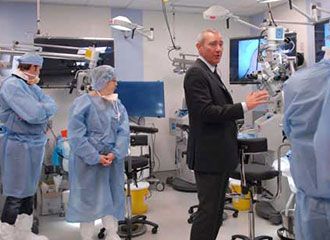Lesions of the skull base present unique challenges for neurosurgeons. Special training is required to perform intricate surgery in the small recesses of the brain. Most skull base neurosurgical approaches require dexterity with surgical instrumentations, specifically bone removal instruments, through restricted corridors that contain vital structures. This aspect of surgery demands that surgeons be proficient not only with the tools but also with the complex anatomy to be negotiated. The development of a sense of the anatomic relationships between neural and vascular structures encased by bone is critical and requires practice. Therefore, a cadaver dissection laboratory environment is the ideal training arena for neurosurgical residents and surgeons who plan to perform skull base microneurosurgery.

In our Surgical Innovations Laboratory for Skull Base Microneurosurgery, trainees perform complex approaches to the cranial base on cadavers under conditions that simulate an actual operation as closely as possible. Our laboratory is a state-of-the-art facility that integrates cadaveric dissections, 3D visualization, virtual reality and computerized simulation for visuospatial surgical procedure skill training. The Skull Base Microneurosurgery Fellowship Program provides comprehensive training, of variable duration from three to 12 months, for neurosurgeons who plan to care for patients with pathologies of the skull base region. Senior neurosurgery residents, as well as neurosurgeons who have completed their residency training and would like to pursue specialized training in this area, are eligible for this program.
Fellowship activities consist of laboratory assignments directed by Dr. Antonio Bernardo, including a teaching role in our ongoing series of international skull base and vascular neurosurgery courses. Laboratory rotations include independent cadaveric dissection to promote the rehearsal of complex skull base approaches, as well as dissection exercises that emulate surgical approach variations and procedure modifications. Fellows are expected to publish findings from their training as they work closely with Dr. Bernardo over the course of their exhaustive cranial base approachment education.
Contact
Antonio Bernardo, M.D.
anb2029@med.cornell.edu

